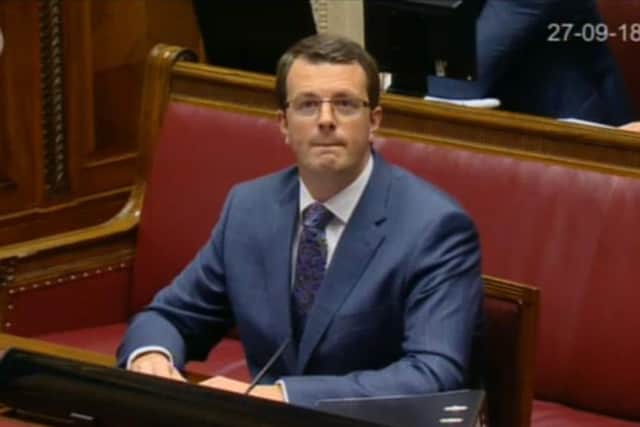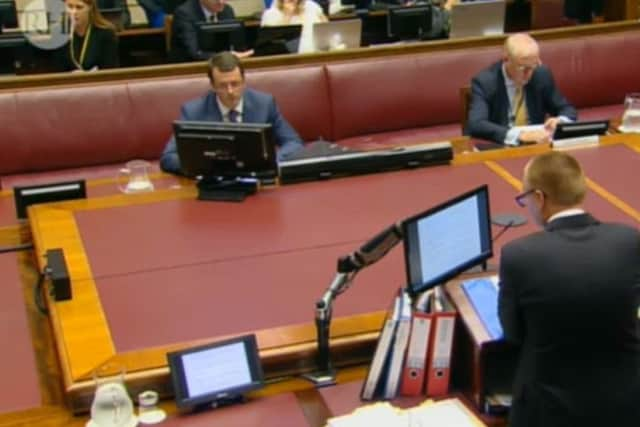DUP Spad Stephen Brimstone '˜didn't think it odd' to heat home with non-domestic RHI
and live on Freeview channel 276
On a second day of evidence at the RHI Inquiry, Stephen Brimstone frequently looked uncomfortable as he explained his involvement with the scheme, even though the inquiry has already said his use of the boiler is consistent with normal use rather than wasteful practice.
The veteran DUP Spad defended what he had done and insisted that he had acted properly – with the exception of failing to formally declare an interest when the issue was being discussed in Stormont.
Advertisement
Hide AdAdvertisement
Hide AdThe inquiry heard how there were two complaints – one in May 2016 and another in October of that year – which alleged Mr Brimstone was fraudulently heating his house on the non-domestic RHI scheme on the premise that he had an agricultural shed. The first complaint said: “The shed is no more agricultural than he is”.


The initial inspection by Ofgem, which runs the scheme, raised a series of concerns, with the inspector suspicious about what was going on after he found children’s toys, a pile of wood for the indoor fire, a tractor and work tables in the ‘agricultural shed’, which seemed more like a big garage.
However, after a protracted investigation during which his payments were stopped Ofgem ultimately concluded that Mr Brimstone’s shed was able to be classified as agricultural and he was properly on the scheme.
Inquiry barrister Joseph Aiken said that Ofgem’s explanation for why it was possible for Mr Brimstone to legally be on the scheme raised other questions about the scheme.
Advertisement
Hide AdAdvertisement
Hide AdHe said that the logic of Ofgem’s interpretation of the rules was such that if someone were to ask a farmer to bring their sheep into their shed for one day a year and for the rest of the year there was no agricultural activity in the building it would be possible to use the non-domestic RHI scheme to put a boiler in the shed, run a pipe to the nearby house, and heat the home year-round.


But despite the authorities saying it was technically possible to do what Mr Brimstone did , he faced robust questioning over his decision to use the non-domestic scheme.
Dame Una O’Brien put it to Mr Brimstone “the clue is in the name – it’s a non-domestic Renewable Heat Incentive scheme”.
She asked him: “When it became apparent to you that it was possible to do this – you know, admittedly, within the rules – did it never occur to you to say ‘Hmm, I wonder if this was really ever intended? Is this right? Should I raise this with Dr Crawford? Should I raise this with the department, and really point out to them that there’s a whole group of potential applicants that don’t appear to be non-domestic who could get into this scheme?’
“Did it occur to you to say ‘This is a bit odd’?”


Advertisement
Hide AdAdvertisement
Hide AdMr Brimstone paused before saying: “It didn’t, and probably my understanding of the scheme – limited as it was, because obviously I had looked into aspects of the scheme – but my understanding of the scheme was that up until July 2015, mid-July 2015, I wasn’t aware that there was a differentiation for example on the tariff between the GB scheme and the Northern Ireland scheme.”
Dame Una said: “But you were aware that a domestic scheme had been launched in Northern Ireland, so there was a non-domestic scheme and then a domestic scheme was launched.”
Mr Brimstone said: “Yes.”
Dame Una put it to him: “And you knew that the domestic scheme of that title offered a less generous incentive.”
The former Spad said: “Yes.”
Dame Una continued: “You were very close to the centre of government. You were in a position where you could potentially have pointed this out more explicitly, given that you’d done the research and got to the nub of it really.”
Advertisement
Hide AdAdvertisement
Hide AdAfter a long pause, Mr Brimstone said: “The intent behind the scheme, from my understanding, was that Europe had placed particular targets on the UK Government to reduce reliance on fossil fuels and CO2 emissions and my understanding was that this scheme was a way to encourage people to...move away from traditional fossil fuels to biomass and other technologies, renewable technologies.
“So yes, maybe I should have – but my understanding at that point was literally that this was a good scheme to really encourage people to move away, whatever the situation was.
“And yes, they did introduce a domestic scheme. But my view was that was to allow a scheme for homes and towns and cities and the countryside to also avail of this scheme to reduce their CO2 emissions.”
Highlighting that Mr Brimstone was primarily heating a domestic property under the non-domestic scheme, Dr Keith MacLean said: “That was primarily what you were doing.”
The former Spad said: “Yeah. Yeah, exactly.”
Advertisement
Hide AdAdvertisement
Hide AdHe went on to add both schemes had “the same purpose” but that he could not heat his shed, as well as his house, on the domestic scheme.
Sir Patrick Coghlin said that he could have “gone back to your electric heater – which you had done for some years”, prompting a smile from Mr Brimstone.
Mr Brimstone said that when Arlene Foster became First Minister he had informed her he had applied to the scheme. He said that he had done so when she was appointed First Minister in January 2016 and she appointed him as one of her Spads.
When asked how Mrs Foster had reacted to the news, he said: “I suppose she just thanked me for telling her. I think she asked ‘are you happy that everything’s OK with it?’ and I would have said ‘yes, my belief is that everything’s OK with the application’ and that was the end of the matter.”
Advertisement
Hide AdAdvertisement
Hide AdWhen asked if it was discussed that the declaration of interest should be formalised by putting it in writing, he said: “No. That wasn’t the way it would have worked. You would have had conversations amongst each other.
“Other than a letter of resignation or a letter of appointment – that was [sic] the sorts of things you put in writing to each other.”
Alluding to the dearth of documentary evidence about key elements of the RHI timeline, barrister Joseph Aiken said sardonically: “I think the inquiry has worked that out.”
Sir Patrick Coghlin said: “In some ways, someone could form an even more serious view... you tell the first minister you have an interest, and having done that you then continue to be involved. And that can play back on the genuineness of your declaration - you’re just doing it for form.
Advertisement
Hide AdAdvertisement
Hide Ad“You may shake your head and so on, but that is the sort of perspective somebody might adopt. That’s why it’s so important.”
Mr Brimstone said: “I appreciate that, chair...I should have stepped back from every instance [of RHI discussion in government], and yes every instance makes the thing even worse.”
The inquiry’s technical assessor, Keith MacLean, said: “It sounds that it goes beyond your judgement as well - you’ve told Mrs Foster, you’ve told Mr Johnston and none of the three of you have come to a conclusion or had a discussion about the need to do something formally and for you to withdraw.”
Sir Patrick said that “the other difficulty” is that all of this was happening at the very top of government, among three people in the first minister’s office.